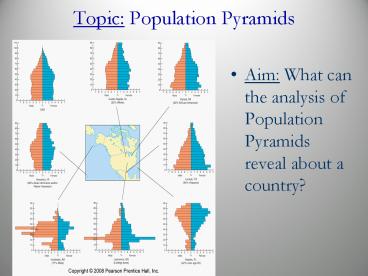Topic: Population Pyramids - PowerPoint PPT Presentation
1 / 21
Title:
Topic: Population Pyramids
Description:
POPULATION PYRAMIDS FOR THE UNITED STATES AND SELECTED U.S. COMMUNITIES Laredo has ... Austria s negative growth means a future with fewer workers to support social ... – PowerPoint PPT presentation
Number of Views:131
Avg rating:3.0/5.0
Title: Topic: Population Pyramids
1
Topic Population Pyramids
- Aim What can the analysis of Population Pyramids
reveal about a country?
2
- Population Structure
- Fertility and mortality vary not only spatially
but also temporally within a country. - A special bar graph known as a population pyramid
can visually display a countrys distinctive
population structure. - X-axis
- Percent male displayed to the left of zero
- Percent female displayed to the right of zero
- Y-axis
- Age cohorts typically grouped in 5-year intervals
- Youngest displayed at bottom and oldest at top
3
Age/Sex Distribution
- Sex Ratio Number of males per hundred females in
the population - More males are born each year, but they have
lower life expectancy - Varies greatly from country to country
- Examples
- Europe and North America 95100
- Rest of World 102100
Russia and other European countries have high
percentages of elderly people who need pensions,
health care, and other services.
4
Age Distribution
- Dependency Ratio number of people who are either
too old or too young to work (dependents),
compared with those people in their productive
years - The higher the dependents, the greater the
financial burden on working population
Dependency Ratio 0-14 Dependents 15-64
Workers 64 Dependents
5
Population Pyramids
- A countrys stage in Demographic Transition gives
it a distinctive population structure that
displays age and gender of a given population - Males are on left, females on right.
- Youngest people on base of pyramid and older
people at the top - The shape of a countrys population pyramid tell
a lot about the country
6
- Each 5 year group with the youngest 0-4 years old
at the base of the pyramid are called cohorts. - A wide-based pyramid indicates a country in Stage
2 of the Demographic transition.
7
For wealthier countries, the chart is shaped like
a lopsided vase. Population is aging, TFRs are
declining.
8
For poorer countries, the chart is shaped like a
pyramid. Infant mortality rates are high, life
expectancy is shorter.
9
- Four Patterns of Population Structure
- Each nation faces different problems due to a
large base with many young or negative growth.
10
POPULATION PYRAMIDS FOR THE UNITED STATES AND
SELECTED U.S. COMMUNITIES Laredo has a broad
pyramid, indicating higher percentages of young
people and fertility rates. Lawrence has a high
percentage of people in their twenties because it
is the home of the University of Kansas. Naples
has a high percentage of elderly people,
especially women, so its pyramid is upside down.
11
Population of Germany, 1989
Germanys population profile is that of a wealthy
core country that has passed through the post war
baby boom and has a low birthrate. Note the
impact of the losses of World War I and World War
II.
12
- Attendants or pushers on the Japan Train
system. Despite having a declining population,
Japan has a very high population density.
13
JAPANS CHANGING POPULATION PYRAMIDS Japans
population pyramid has shifted from a broad base
in 1950 to a rectangular shape. In the future,
the bottom of the pyramid is expected to contract
and the top to expand.
14
Slow Growth
- A country in stage 4 of the Demographic
Transition Model - Large number of older people
- Smaller of young people
15
No Growth
- End of stage 4, entering Stage 5
- Large number of older people
- Very small of young people
16
Affect of AIDS on population pyramid for South
Africa. Predicted population for 2035, without
and with AIDS. With AIDS, looks like a population
chimney.
17
- AIDS is leaving large numbers of AIDS orphans.
18
- 1995 Population Pyramids reflect the economic
prosperity of Western Europe and the less
developed countries of Sub-Saharan Africa. In
the mid-1990s almost 50 of Africas population
was under 15 years of age. - By contrast the number of people 65 and older in
Western Europe is 5 times that of sub-Saharan
Africa.
19
What do these pyramids reveal about their
respective nations? List all the information you
can surmise, both explicit and implicit.
20
Age Structure of a Population
- The populations of many areas are aging. Europe
and Japan are good examples, whereas some nations
have very young populations (e.g. - Iran where
the median age is 26.4 years for males)
Bordeaux, France
21
Summary Free Response































